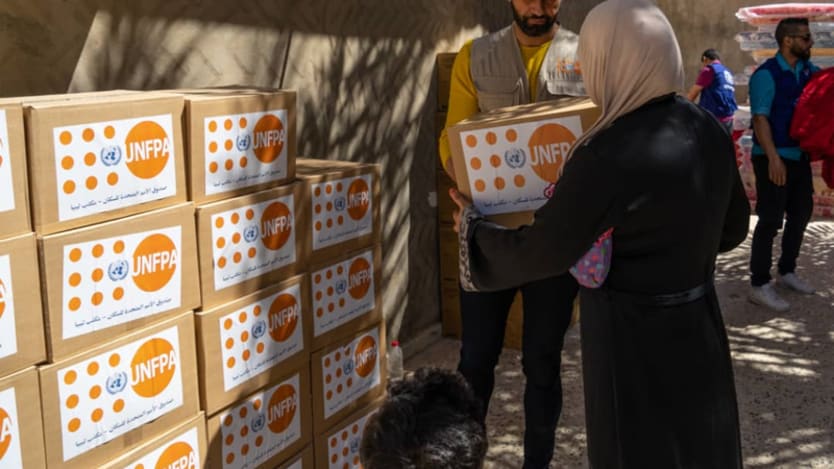
KAMPALA — The United Nations Population Fund had not had an office in Libya since 2014, when it evacuated its team to Tunisia to work remotely amid a deteriorating security situation. But last year, it reopened a main office in Tripoli, as well as sub-offices elsewhere in the country, and is slowly rebuilding its presence.
That decision was based on a desperate need to tackle rampant sexual torture and human rights violations inside Libya’s detention centers that house migrants and refugees, as well as the broader goals of preventing maternal deaths and addressing gender-based violence, said UNFPA’s Libya representative Bérangère Böell-Yousfi.
“There are also a lot of misconceptions about what we mean by GBV … Behind the word gender, some understand that to mean we are promoting Western conceptions and LGBT [advocacy].”
— Bérangère Böell-Yousfi, UNFPA Libya representativeIn 2018, UNFPA reached more than 2,600 GBV survivors in Libya, distributed 8,500 dignity kits — which include items such as soap, underwear and toothpaste — and trained five health personnel on GBV case management.
Unusually, in Libya, much of the organization’s caseload is made up of men and boys, who — as the majority of refugees and migrants — are vulnerable to sexual and gender-based violence.
Böell-Yousfi spoke to Devex about UNFPA’s renewed operations in Libya, how it plans to reach more men and boys, and how it’s overcoming challenges.
This conversation has been edited for length and clarity.
Why did UNFPA reopen its office in Libya?
For us, it was absolutely necessary to be present in Libya, especially to contribute to two of our main goals: Ending preventable maternal deaths and ending GBV and harmful practices.
The population currently — according to the projections, because there's been no census since 2006 — is at 6.7 million people and 690,000 migrants and refugees.
Of these, you've got around 4,000 migrants in detention centers going through [horrendous] conditions with much concern over their protection, well-being, and safety … Sexual violence is prominent. Rape is being used as a weapon of war and there are several testimonies — especially of migrants when they arrive on the Italian shore — that provide horrendous information ...
This is very difficult in terms of access to information because it's extremely difficult for someone who's been a victim to speak out. From the reports that are being produced by several organizations, men and boys — because they are the bulk of the population of migrants and refugees — are the ones suffering the most, and very few dare to talk.
What are your next steps in terms of accessing those who have been dealing with sexual violence?
First of all, we need to ensure that systems are being strengthened. UNFPA is the lead organization among humanitarian actors for coordination on GBV. Our role, alongside the Libyan authorities, is to establish a GBV coordination system that is efficient, allows international standards to be applied, and provides access to information.
There are several tools available. The GBV information management system ensures all actors working on GBV collect data in the same way … We also have key interventions for raising awareness among the population and providing social services like psychosocial support.
We have teams deployed in internally displaced persons camps and cities. We have done capacity building with the Ministry of Health and health practitioners on the clinical management of rape, and provided kits, because there are specific kits that have to be used whenever a victim is reported to a hospital ... It's a work-in-progress because we started only as of last year.
There are also a lot of misconceptions about what we mean by GBV … Behind the word gender, some understand that to mean we are promoting Western conceptions and LGBT [advocacy], which may shock cultural and religious [beliefs] ... But GBV is the protection of any single individual without discrimination ... It's humanitarian assistance to someone who is a victim of violence.
What are some of the other difficulties that you experience in operating in this context?
There are challenges with access to migrants and refugees in detention centers and prisons. There is no space to do consultations with privacy and confidentiality. In order for us to access victims, or potential victims, of GBV we need to have the right environment ... This is something that’s very challenging ...
We are [also] very much concerned that the conflicting parties are not respecting the international humanitarian law — ambulances or health workers are being injured or killed while performing their duties and saving lives.
The population in Libya is full of resources and innovation. There is much potential and willingness. The number of young people who are responding to the humanitarian crisis is enormous. That is an area that we really insist we need to work more on in order to make sure that they are at the heart of peacekeeping and community trust ... Most of the population is only aspiring for peace and is ready to listen and work together.
What's the best way to overcome some of these access challenges?
First and foremost, is to end the conflict. Until then ... there will be no way to have real solutions …
We've done surveys among the young population that represents over 40% of the overall population, and the first thing they ask for is safety and security ... They want to be part of the political negotiation and they want their voices heard.
Once this is ticked off ... we can ensure all the initiatives for building strong systems take place. In terms of GBV, we can then make sure there is an essential package of health services, social services, justice services, and police services in place, in addition to raising awareness and understanding of what this protection means.
Read more on gender-based violence:
► Q&A: NORCAP's executive director on why 'we have to demystify' gender-based violence
► Adolescent girls face violence, forced marriage in refugee communities








